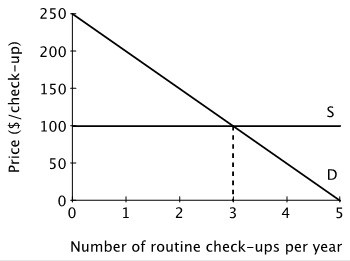Keynes called money people hold to make routine day-to-day purchases the:
A. transactions demand for holding money.
B. precautionary demand for holding money.
C. speculative demand for holding money.
D. store of value demand for holding money.
Answer: A
You might also like to view...
Alfred derives utility from consuming iced tea and lemonade. For the bundle he currently consumes, the marginal utility he receives from iced tea is 16 utils, and the marginal utility he receives from lemonade is 8 utils
Instead of consuming this bundle, Alfred should: A) buy more iced tea and less lemonade. B) buy more lemonade and less iced tea. C) buy more iced tea and lemonade. D) buy less iced tea and lemonade. E) none of the above is necessarily correct.
Suppose the figure below shows Luke's demand curve for check-ups along with the supply curve for check-ups.  If Luke had first-dollar medical insurance, then he would choose to have ________ check-ups a year.
If Luke had first-dollar medical insurance, then he would choose to have ________ check-ups a year.
A. 4 B. 5 C. 3 D. 2